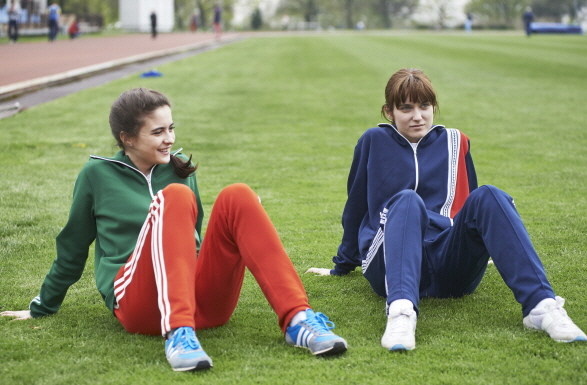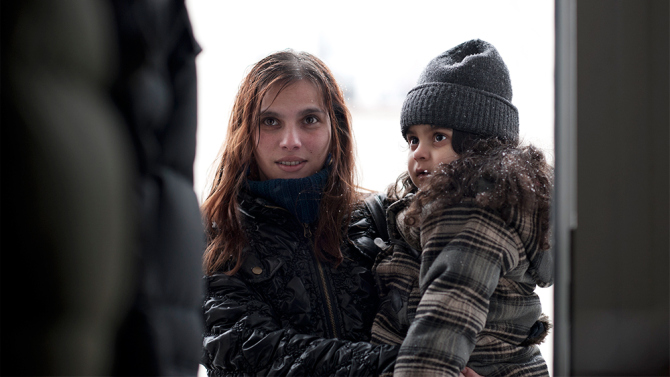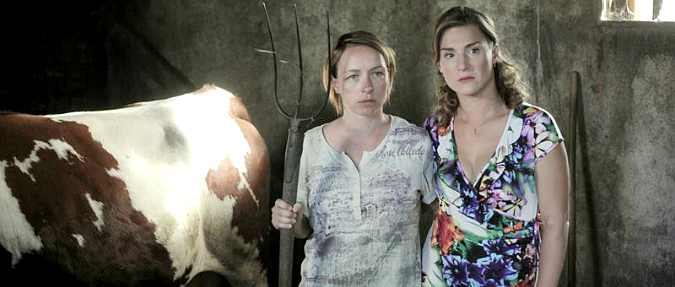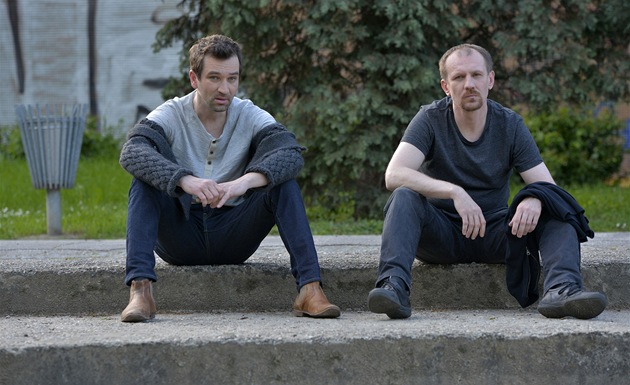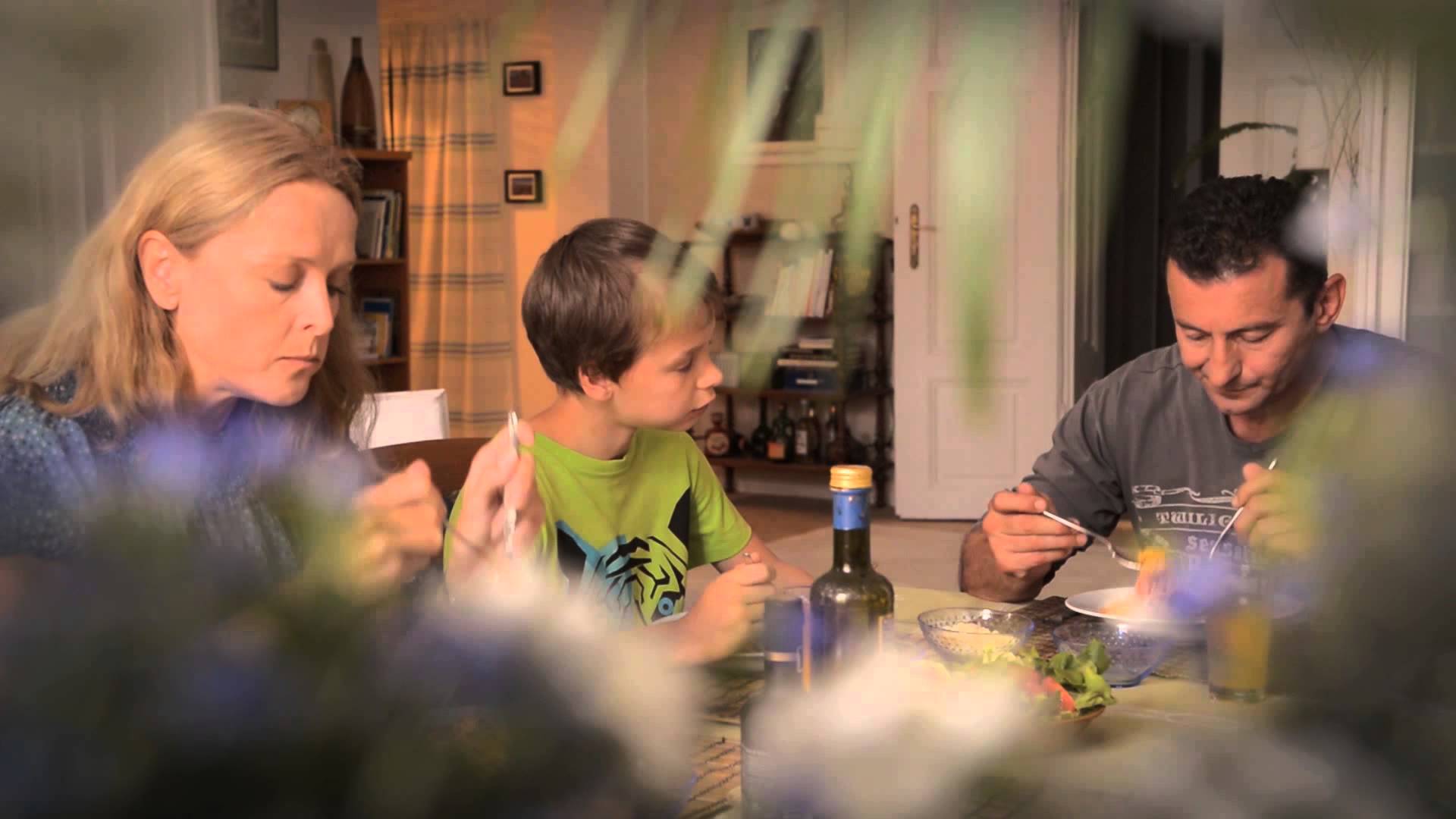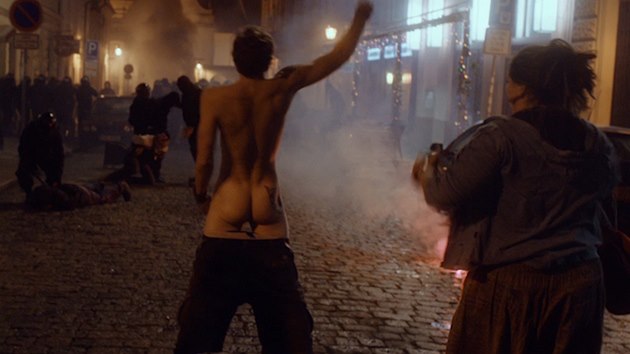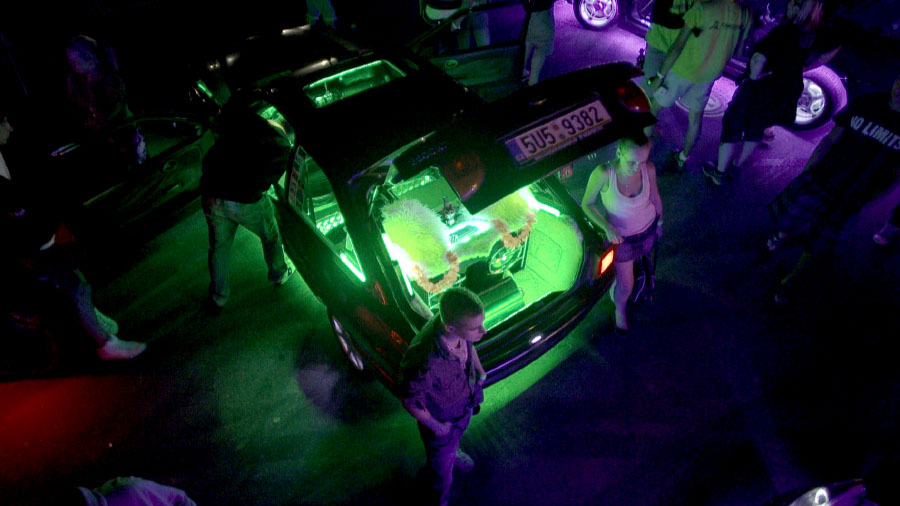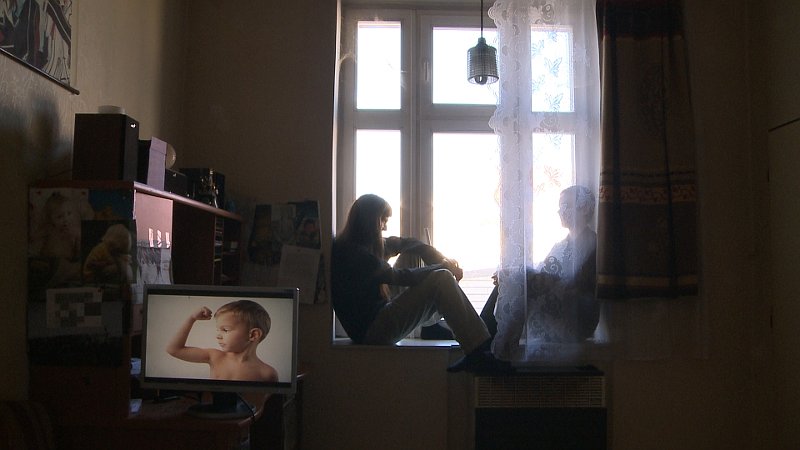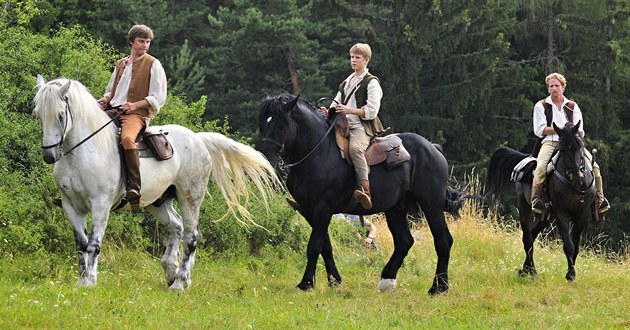








On Awards Patterns And Fair Play
According to the Czech Film and Television Academy, bestowers of the Lions, a pattern of the ideal Czech film, has slowly yet quite visibly emerged over the Lions' last few editions.
This awards favorite formula started with the miniseries-cum-feature film The Burning Bush directed by Polish veteran Agniezska, and In the Shadow the year before. Both featured stories set in the former Communist reign, depicting moral heroes resisting to compromise their own integrity. Holland's film touched upon the martyrdom of student Jan Palach, protesting against the authorities by self-immolation and followed attorney Dagmar Burešová on her quest to purge Palach´s post-mortal reputation, as his act and himself was growing into a bigger statement and symbol. In the Shadow was set in 1950s Czechoslovakia, and was about a captain investigating a crime linked to the secret police.
The Czech Academy revealed its overall opinion on what was the best domestic film of 2014, after selecting sports drama Fair Play, directed by Andrea Sedláčková as the country´s Foreign Language Oscar submission. To no surprise, the story is of a young promising athlete on her way to a bright career occurs in commie Czechoslovakia just before the 1984 Los Angeles Olympic Games. The parallel plot deals with the protagonist´s mother trying to get her daughter out of the Commie-stricken country.
Things get a bit more tangled when the Communist party sets to use sport as yet another tool of political propaganda supported by steroid-enhanced athletes. The young athlete finds herself in the moral dilemma of whether to succumb to the party´s and trainer´s pressure or try to make it clean, despite being intimidated with the party´s promise to ruin her life.
Fair Play dominated the nominations, with one in every single category excluding Best Documentary, though the film´s director nabbed one there too, with a portrait on Czech´s beloved president, dissident and writer, Life According to Václav Havel. Fair Play is a piece of well-crafted mainstream-oriented morality by an experienced and talented filmmaker which easily fits into this seemingly winning formula.
However, the Czech cinema has been quite busy producing a strong number of features every year, so it would be a shame to adamantly mount the spotlight on just one single film. And in Fair Play's case the film left awards night empty-handed except for two non-statutory prizes for Best Film Poster and Film Fans´ Award.
The Way Out
Czech Film Critics' Awards: Best Film, Best Director, Best Screenplay, Best Actress
Czech Lion awards: Best Film, Best Director, Best Actress, Best Screenplay, Best Cinematography, Best Editing, Best Sound.
Petr Václav, the Czech filmmaker living and working in France, returned to the theme of racial discrimination that he had already treated in his feature debut Marian (1996). The prejudice based on race persists as a hot topic in the Czech Republic, and attracted even more attention as the government rests idle. The Slovak film My Dog Killer addressed the affair partly. Václav focuses on one decent Roma family struggling to make ends meet. Václav plunges amidst the Roma community in docudrama fashion.
A somewhat Cinderella story emerged from The Way Out's success as the director cast non-actors, and specifically Klaudia Dudová, the main protagonist, a 26-year-old shop clerk, who went from behind the counter to before the camera and then to stroll La Croisette for the film´s premiere at Cannes. To sprinkle more fairy-tale dust in the fate of this young Roma mother, Dudová won Best Actress awards at both Czech Film Critics´ Awards and Lions, a first for a Roma woman. These, in addition to the Blue Angel award for Best Female Performance at Slovakia's Art Film Fest. She will already stars in Václav's next feature alongside popular professional Czech actor Karel Roden.
The Way Out is an unbiased and humane look at common problems within the Roma community, such as youth pregnancy, lack of education, even abuse by Roma moneylenders or pimps. Despite its anchoring in an ostracized ethnic minority and strong social and moral commentary, Petr Václav touches somewhat universal human themes of the daily struggle against all odds to find a modest place in life and in the world.
The director displayed great personal investment and belief in the cause also in his speech shortly after winning the Best Director award at the Czech Film Critics´ awards, convincing enough and honest to dispel the shadows of mistrust around the possible exploitation of the community during production.
Nowhere in Moravia
Czech Lion awards: Best Actor, Best Supporting Actress, Best Supporting Actor
A bleak dramedy and directorial debut by actor and theatre director Miroslav Krobot, Nowhere in Moravia, revolves around existential themes and questions relating to less the metaphysical and more of a sense of what to do with life.
Maruna (amusingly laidback Tatiana Vilhelmová) works in a local pub, serving the same drinks to the same barflies following religiously the same daily routine (she also plays organ in the church). She lives with her somewhat oppressive mother and a sister Jaruna (Krobot´s daughter Lenka) who works as a nurse. One day, an opportunity arises for Jaruna to start a decent life in nearby Germany when an elderly gentleman, Hans, comes to the village to bury his recently deceased sister.
The sugar-daddy element (she is in her late thirties, he past sixty) sort of eases into an underdeveloped black comedy, which stands as a marker that a better life can indeed be achieved...at what cost remains open for a discussion.
Krásno
Czech Film Critics Awards: Best Actor Czech Lion awards: Best Music
Allegedly based on true events experienced by Martin Finger, co-author of the screenplay and one of the two central protagonists, Krásno is an odd mixture of buddy comedy, noir and crime caper packaged in a dark comedy.
Two big city boys, Michal (Martin Finger) and Adam (Ondřej Sokol co-writer and debuting director of the film) are returning to their rural hometown after 20 years. On the day of their arrival, Michal´s ill father dies. Father and son detached after Michal´s mother died under suspicious circumstances in the town´s nearby lake Krásno and Michal did not stop blaming his father. Dubious behaviour of Michal´s step-mother leads both friends to reinvestigate what has really happened to his mother.
Krásno's hybrid narrative shape mostly twists the detective genre on its head as the plot is fuelled by the protagonists´ assumptions and obsessions. The homecoming affair turns suddenly into a hunt on the long cold case. An unusual endeavour Krásno's black comedy setup bears several resemblances to the Coen Brothers or Martin McDonagh, but suffers from an inconsistent screenplay and too much improvisation (Sokol acts in an improv sketch show). Hopefully, Krásno has pioneered a new trend in domestic cinema and more bleak comedies start rolling out soon.
To See the Sea
Czech Film Critics´ Awards: RWE Award for the Discovery of the Year
From teen stardom to director´s chair. That´s the story of Jiří Mádl, once star of teenage comedies, now an emerging director and screenwriter. To See the Sea is an unexpectedly melancholic film shot through the lens of an 11-year old kid who desires to become the next Miloš Forman. He starts recording everything on a digital SLR camera (the film was shot entirely on such cameras) while a story starts to unfold... a suspicion his father hides an extra-marital affair and his best friend´s home abuse.
The emergence of more alternative and innovative works praised for originality is beginning to elicit a positive trend in Czech cinema. The daring black comedy Krásno prepared new ground for this, while To See the Sea expands the rupture in the so called old routine. Jiří Mádl jumps into the limelight with his unobtrusively sounding first feature.
Hany
Czech Film Critics´ Awards: Best Cinematography (ex aequo with Places)
Young director Michal Samir delivers his feature debut Hany, produced by Matěj Chlupáček (possibly the youngest director in Europe who succeeded in shooting his feature debut Touchless before celebrating 19th birthday in 2013). The film allegedly unfolds in one shot, the first of its kind in domestic cinema and a great pitch for PR blurb.
Hany has cuts, one explicit and two digitally camouflaged though that does not undermine the spectacular camerawork by Slovak Martin Žiaran, switching steadicam, handcam, trackingshots and craneshots according to circumstances, floating vertically and horizontally capturing one night on one street.
The night begins in a café where an aspiring writer starts reading his new piece Marquis de Sorrow, while the camera restlessly fluctuates from one character to another retaining bits of rather vague conversations. The filmmaker wanted to make a portrait of twentysomething generation revolting for the sake of revolt. The observation peaks in a sudden riot, looting and senseless partying. Jiří, a student and petty drug dealer, who has problems with self-control and hides behind the mask of poseur and oppressor soon becomes crowned as the prototype and spokesperson of the generation. The sparsely-plotted oeuvre intrigues by its carefully orchestrated and paced camera and sound design, taking over the role of usual film editing.
Although the film experienced a lukewarm reception, most of the criticism assigned to a simple screenplay, the technical mastery cannot be denied. It is sure a great launchpad for both young filmmakers.
Into the Clouds We Gaze
International Documentary Film Festival Jihlava: Best Czech Documentary
Czech Film Critics´ Awards: Best Documentary
Docu-pics undeniably belong to the complex portrait of national cinema and the Czech one is not an exception. Into the Clouds We Gaze became the much lauded documentary of the 2014. Behind the poetical title lies a portrait of young Ráďa and a hobby that fulfils his entire life: a car. Ráďa is an avid, passionate and proud member of an auto-customising subculture. His old car produces a green halo thanks to diodes implanted underneath it and on the inside, it´s literally the biggest achievement of his life.
The director Martin Dušek follows a seemingly insignificant person, some critics even labelling the protagonist “white trash”, and uses him as a springboard for a bigger picture. The insignificant life of the man-child inept to retain a steady job while pursuing the ultimate career aspiration of becoming a driver of a forklift serves as a probe into the life in northern Bohemia wielding several layers. A car was once considered a token of higher social status. And Ráďa being lower on the social ladder clings to the car with the intensity of a dead man´s clutch, unwilling to let go despite the fact that the car is, for an unemployed and penniless person, a heavy burden.
The unflattering probe in Ráďa´s life uncovers a larger generation crisis the director achieves without mockery or making farce out of its protagonist, who doesn´t seem to be conscious of his and his peers situation. Ignorance is bliss indeed, but what´s next?
Daniel´s World
In Veronika Lišková documentary, Daniel is a 25 year-old literary student and aspiring writer who decides that the time is ripe for his coming out... He is a homosexual pedophile. Many films, be it documentary or fiction, address LGBTQ issues heavily striving for social integration and acceptance, although pedophiles have been dreaded and lynched.
Daniel considers himself a good pedophile, the one who wouldn´t dare hurt anybody, an ethos he clings to his whole life. He let Lišková into his direct presence, not masking himself and speaking openly about the life of a pedophile, explaining various situations he has encountered and how he copes with them (many such cases end in suicide). Lišková tries to create a humanistic portrait, capturing Daniel in the most common circumstances as he hopes to meet (platonically) his love, little Michael, or standing alone the pride march trusting somebody like-oriented will eventually show up as the theme is coming out.
Daniel´s World shows pedophiles as intelligent people conscience of their situation and further implications on their lives as Daniel sadly unveils he wouldn´t be able to have a family of his own, neither a partner while proclaiming he does not approve of legislation of child porn.
The film provokes further discussion as the director herself hesitates in replying the question whether she would let her child play with Daniel, though it provides also unprecedented insight into a clandenstine community.
Domestic Films in the Czech Box Office
The yearly box office charts present a common tool in discussing the happenings in cinema. In the Czech Republic, the number one spot of the most visited theatrically released film actually belonged to a domestic production of fairy tale musical Three Brothers by father-son team Jan a Zdeněk Svěrák, a duo behind the Academy Award winning film Kolja. This Singalong about three brothers each representing one of the classic children fairy tales (Sleeping Beauty, Red Riding Hood and The Twelve Months) tallied in total 661,378 paying customers as opposed to the final installment in The Hobbit´s trilogy ranking second (566, 694).
Sixth place in the domestic top 20 was the second film in the trilogy of village comedies Babovřesky known for its fairly low-brow humour. Next up was retro rom-com The Tender Waves (read the review here).
At twelfth place, preceding Gone Girl in thirteenth, sits the unconventional cross-genre film The Storyteller. The promo campaign was advertising it as a “chick flick”, yet The Storyteller revealed to be a dramatic love triangle, where the man leads a double life between two women, all the while unfolding against a crime investigation around the identity of a drowned corpse. Thanks to solid genre trappings, amazing cinematography and the parallel plots, The Storyteller is not just an overblown CSI episode.
Ranking at 16th is the drama about young generation and graffiti subculture, Prague Cans (Read the review here), and at 17 is the already mentioned Nowhere in Moravia. Just before the last film in the domestic top 20, Captain America: The Winter Soldier, is a Czech remake of a of Italian romantic teen comedy 10 Rules working from the overwrought formula of an underdog falling in love with his ideal girl, seen by 141, 865 viewers.

Around the Internet
Recent Posts
Now Playing: SCREAM 7 Not So Scary, GHOST ELEPHANTS Not a Myth
Leading Voices in Global Cinema
- Peter Martin, Dallas, Texas
- Managing Editor
- Andrew Mack, Toronto, Canada
- Editor, News
- Ard Vijn, Rotterdam, The Netherlands
- Editor, Europe
- Benjamin Umstead, Los Angeles, California
- Editor, U.S.
- J Hurtado, Dallas, Texas
- Editor, U.S.
- James Marsh, Hong Kong, China
- Editor, Asia
- Michele "Izzy" Galgana, New England
- Editor, U.S.
- Ryland Aldrich, Los Angeles, California
- Editor, Festivals
- Shelagh Rowan-Legg
- Editor, Canada


